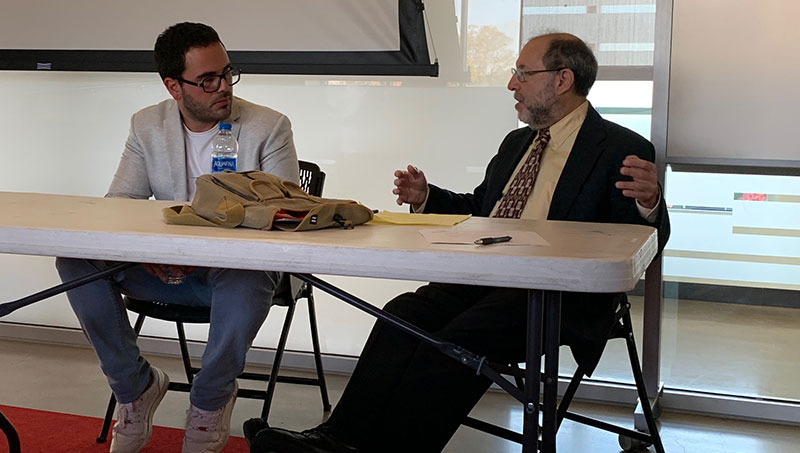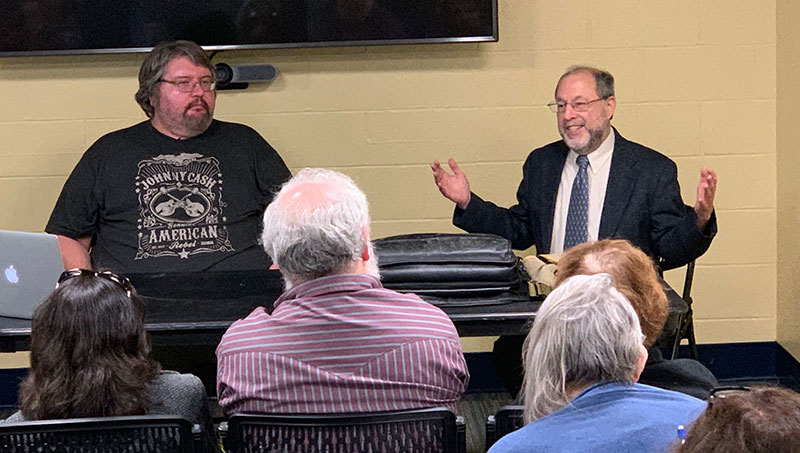
The Charger Blog
Computer Science Student’s Guide to Getting Through Finals Season
Charger Shana-Kay Hyde ’27 shares what she’s learned about planning, studying, and taking care of herself during finals.
The Charger Blog
In response to the growing number of incidents of antisemitism across the country, a sub-committee of the University of New Haven’s Inclusion, Diversity, Equity, and Access (IDEA) Council created the Human Rights Law and Policy Speaker Series. Martin A. Goldberg, J.D., LL.M., a business and tax law professor who spearheaded the creation of the series, discusses the importance of exploring new approaches to combatting antisemitism on college campuses, across the country, and around the world.
November 8, 2019

For many years now, maybe decades, I’ve noticed two trends.
One trend is an increase in the amount of censorship of viewpoints taking place on U.S. college campuses. More and more we see flat-out refusal to hear or even acknowledge the legitimacy of viewpoints that aren’t on what seems to be a pre-approved list.
The second trend is the explosion worldwide of antisemitism. And, on many levels more distressing, U.S college campuses have become one of the main breeding grounds for antisemitism.
I can’t say whether one of these trends is the original cause for the other. I am, however, confident that over the years the two trends feed each other.
Over the last year I have been working with an ad hoc committee as part of the University’s IDEA council, with an initial charge to produce a speaker series to combat antisemitism. At the outset, I wasn’t sure what direction this would take, but one thing was clear to me. I could not just repeat “antisemitism is bad,” or even just memorialize the Holocaust. Messages like these, while important, did nothing, in my opinion, to stem the explosion of antisemitism worldwide and, particularly, on U.S. campuses.

So, in creating the lineup for the speaker series, I stepped back a little, and looked at the bigger picture: human rights. The rights of indigenous people, the rights of the different LGBTQ+ communities, the rights of women, the rights of the poor, the rights of all disadvantaged and oppressed peoples.
And, one speaker after another, we are presenting a series to do two things: One, to show the reality that Israel and the Jewish people are the champions of human rights, not, as the popular antisemitic fictions would tell you, the violators of human rights. And two, to try to be truer to the soul of academia, where information is welcome and diverse viewpoints are heard.
The last of our currently-scheduled speakers will be here on Thursday, November 14, from 3 to 4:30 p.m., in the Alumni Lounge. This will be Kay Wilson, the victim of a terrorist attack in Jerusalem in 2010, where she was left for dead, and, in fact, her friend was hacked to death in front of her eyes.
"At the University of New Haven, we don’t always agree, but we don’t censor viewpoints. We let people speak, we let people listen, we let people debate, and we enable people to learn."Martin A. Goldberg, J.D., LL.M.
Hers is an amazing story of survival, one of physical and emotional healing. It’s also a story of law enforcement, crime scene investigation, and digging through a complex system of different cultures not always cooperative with each other. Possibly the biggest part of the story is that Kay, instead of turning against the Palestinian culture that bred her attackers, continues to work with them to improve their lives.
As of now, there are no further speakers scheduled, even though there are so many stories as valuable as Kay’s that need to be told. The future existence and direction of the speaker series will depend on you.
Please come, listen, question, and even argue, if you’d like. This is true academia at the University of New Haven, something becoming more and more rare on U.S. college campuses, and it is something you can support by simply showing up.
At the University of New Haven, we don’t always agree, but we don’t censor viewpoints. We let people speak, we let people listen, we let people debate, and we enable people to learn.

The Charger Blog
Charger Shana-Kay Hyde ’27 shares what she’s learned about planning, studying, and taking care of herself during finals.

The Charger Blog
Supported by the Bartels family, the Hatfield Scholars Program continues its mission of recognizing students who excel in the classroom and who uplift the Charger community.

The Charger Blog
Charger Blogger Beatrice Glaviano ’26 chats with her boyfriend, a fellow Charger, about studying paramedicine, finding balance, and his plans after graduation, while consuming plenty of peanut butter M&Ms.